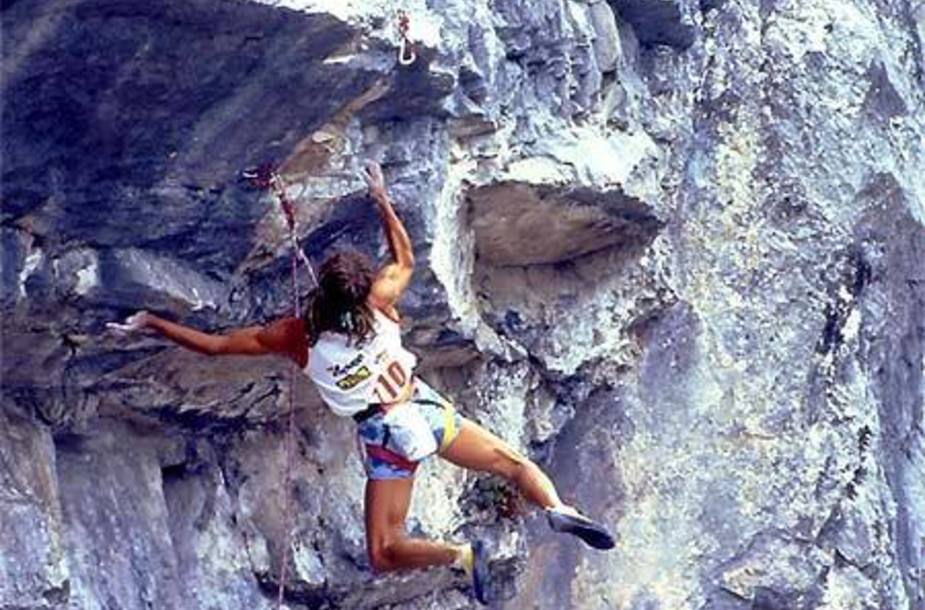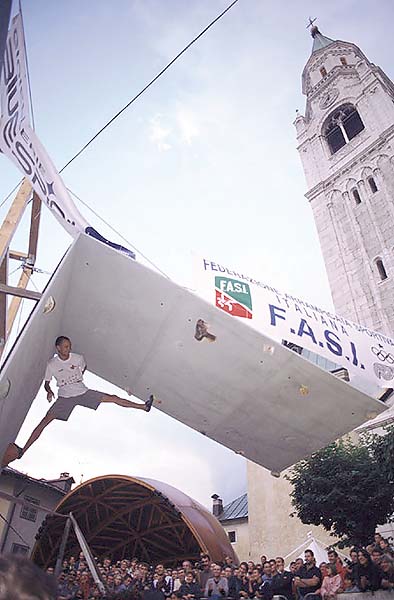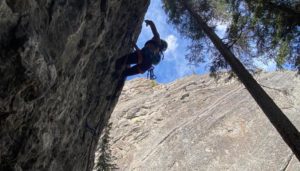A History of Climbing Competitions Since 1985

International climbing competitions have come a long way in the past few decades. As we ready for this year’s IFSC World Cup season, in which many Canadians will be heading overseas, it’s important to know how far competition climbing has come.
1985: In the Olympic town of Bardonecchia, Italy, not far from Torino, Andrea Mellano, a member of the Academic Group of CAI, and Emanuele Cassarà, a well-known Italian sport journalist, gathered a group of the best climbers for an event called SportRoccia held at a natural crag in Valle Stretta.
It was the first organized Lead competition, launching a new era of modern Sport Climbing. Thousand of spectators were amazed by the victory of German athlete Stefan Glowacz.
1986: The success was repeated the following year in 1986, when Arco di Trento became host to the second SportRoccia event. The final was won by French superstar Patrick Edlinger and his compatriot Catherine Destivelle. More than 10,000 people attended the finals, including seven European television stations, as well as many media operators.
The same year, the French Federation organized the first indoor event at a gymnasium in Vaulx-en-Velin, a suburb of Lyon. The potential future for Sport Climbing became clear as all climbers began to show interest in this new branch of their sport, even those who appeared reluctant at first.

1988/1989: At the International level, the French Federation and Paul Brasset lead a movement to convince the UIAA to officially recognize the competitive Sport Climbing circuit, which had grown substantially with the addition of the World Series in 1988 and the first World Cup in Speed and Lead in 1989.
As a result, Brasset created a new organization within the UIAA (formed by the CEC and CICE) that was responsible for training officials (judges and forerunners) and creating competition rules.
1990: In the early 90s, several large events were organized in all the main arenas of Europe, as well as in Japan and the US. During these years, it was decided that International events would be run only on artificial walls, in order to eliminate any environmental impact.
1991: The first World Championship was organized in Frankfurt, Germany, an event that now occurs every two years.
1992: The first Youth World Championship took place in Basel, Switzerland. Large participation at the event demonstrated how popular Sport Climbing had become with the younger generation. It is now an annual event.
1997: A new structure, the ICC – International Council for Competition Climbing – was created inside the UIAA, in order to guarantee sufficient autonomy to the sport and to provide it with the tools required for growth and development.
1998: In 1998, Bouldering was officially introduced as a new climbing discipline. A test competition was organized dubbed the “Top Rock Challenge,” and its success lead to the creation of the World Cup in 1999.

2000: The sport continued to grow with more than 45 countries regularly participating in official calendar events. The calendar included the World, Youth, and Continental Championships, the World Cups, the Continental circuits, as well as other high profile International competitions.
It also sponsored promotional events for under-age kids (spiderkids) and amateurs. Today, more than 75 countries participate in climbing competitions held all over the world, with the World Championships and Youth Championships being the most popular events.
2005: In 2005, Competition Climbing was added to events of the Duisburg World Games and the Asian Indoor Games to great fanfare.
2006: In 2006, the UIAA decided to end its governance of Competition Climbing and supported the creation of an independent International Federation to govern this sport.
The first International Paraclimbing Competition took place in Russia, Ekaterinburg, within the European Championships. Athletes with a visual impairment and with a physical disability from Belarus, Italy, Japan and Russia took part in the competitions.
2007: On Jan. 27, 2007, in Frankfurt, Germany 57 Federations founded the International Federation of Sport Climbing (IFSC). The Statutes and By-laws, as well as the regulations of the new International Federation were adopted unanimously. On April 28, 2007, the AGFIS General Meeting accepted the IFSC as a new member.
A few weeks later, the IWGA also accepted the IFSC, confirming climbing’s place in the 2009 Kaoshiung World Games.
On Dec. 10, 2007, the IOC granted provisional recognition to the IFSC, welcoming sport climbing into the Olympic Movement. The number of members has now reached 80 countries from five continents.
2008: In 2008, the first IFSC Paraclimbing Cup was organized in Moscow, Russia, within the IFSC Bouldering and Speed World Cup event. Athletes with a visual impairment and with a physical disability from Belarus, Italy, Ukraine and Russia took part in the competitions.
2010 On Feb. 12, 2010, the IOC gave definitive recognition to the IFSC, officially welcoming it as part of the Olympic Family.
For the first time in 2010, IFSC Paraclimbing Cup series was organized. They took place in Ekaterinburg, (RUS), Val Daone (ITA) and Chiba (JPN). Thirty-eight climbers (26 men and 12 women) from Belarus, Italy, Japan, Malaysia, Russia and Spain took part at the competitions.
2011: On July 4, 2011 the IOC Executive Board decided to include sport climbing on the short-list (with seven other sports) as a possible new event for the 2020 Olympic Games. This was the start of a new millennium for Climbing.
The first IFSC Paraclimbing World Championships were organized within the program of the eleventh World Championships in July 2011. Climbers with and without a disability were fully involved in the event from the opening ceremony until the closing ceremony. T
hirty-five athletes (30 men and 5 women) from eleven countries competed. The Paraclimbing World Championships now takes place every two years, parallel to the World Championships.
2013: Thanks to the shortlist for the 2020 Olympic Games, the IFSC benefited from a major worldwide exposure and gains international support.
2014: Sport Climbing was chosen by the IOC as a demonstration sport at the Youth Olympic Games in Nanjing, China.
2015: In September, Sport Climbing was officially proposed as a new sport for the Tokyo 2020 Olympic Games by the Tokyo 2020 Additional Event Programme Panel.
2016: Sport Climbing is officially confirmed as an additional sport for the Tokyo 2020 Olympic Games by the IOC Session. Along with four other sports, including Baseball, Softball, Karate and Surfing, Sport Climbing is accepted into the program of Tokyo 2020.
2017: The International Paralympic Committee welcomes Sport Climbing into the Paralympic family by granting the IFSC the status of a “Recognised International Federation.”


